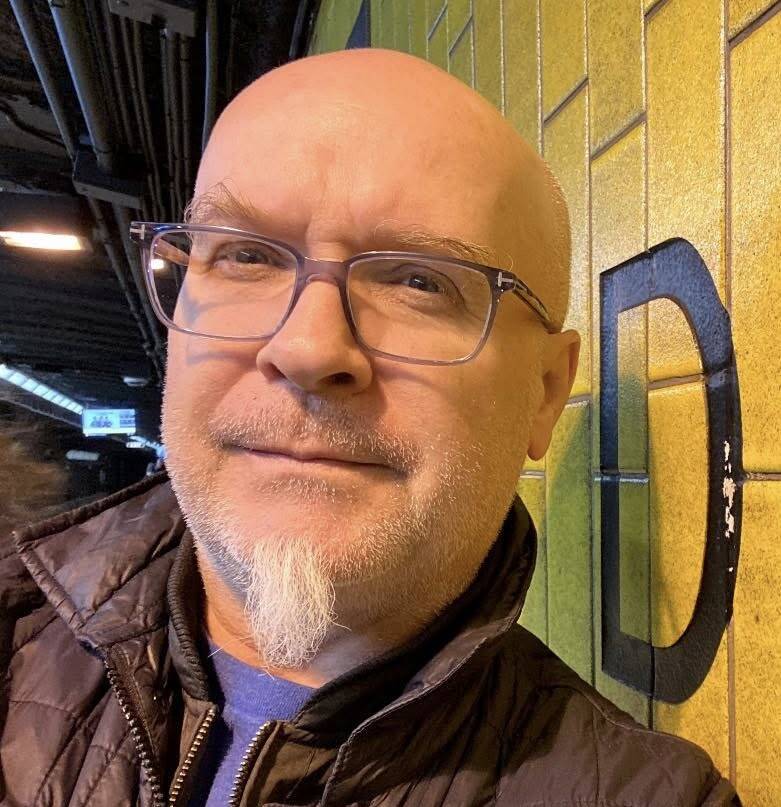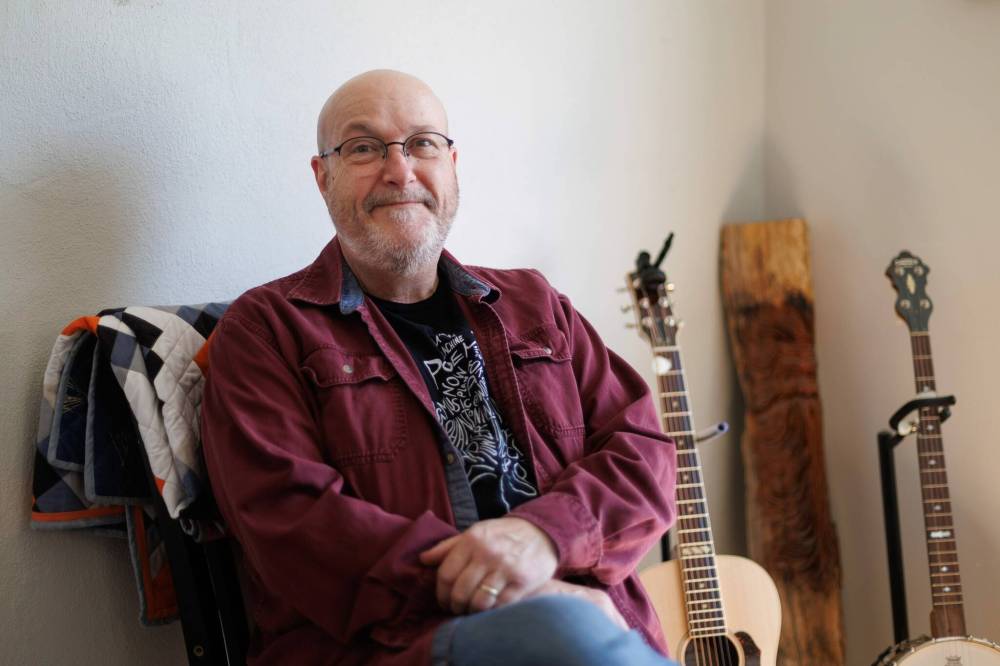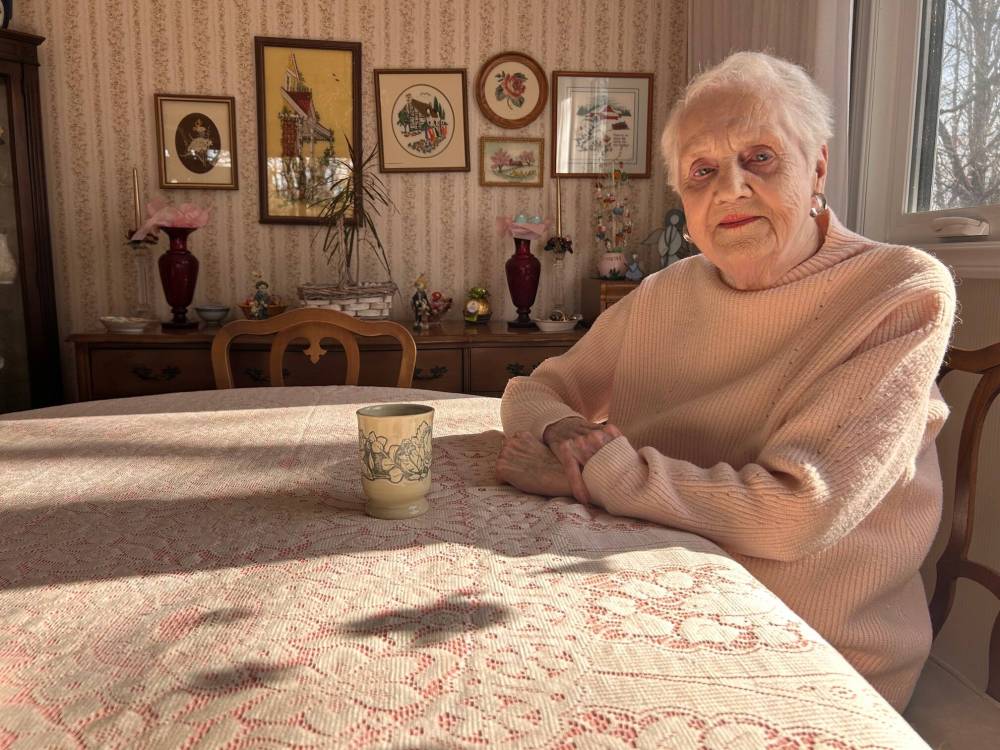Despair, what is it good for? With a world in turmoil, hopelessness a call to action
Read this article for free:
or
Already have an account? Log in here »
To continue reading, please subscribe:
Monthly Digital Subscription
$0 for the first 4 weeks*
- Enjoy unlimited reading on winnipegfreepress.com
- Read the E-Edition, our digital replica newspaper
- Access News Break, our award-winning app
- Play interactive puzzles
*No charge for 4 weeks then price increases to the regular rate of $19.95 plus GST every four weeks. Offer available to new and qualified returning subscribers only. Cancel any time.
Monthly Digital Subscription
$4.99/week*
- Enjoy unlimited reading on winnipegfreepress.com
- Read the E-Edition, our digital replica newspaper
- Access News Break, our award-winning app
- Play interactive puzzles
*Billed as $19.95 plus GST every four weeks. Cancel any time.
To continue reading, please subscribe:
Add Free Press access to your Brandon Sun subscription for only an additional
$1 for the first 4 weeks*
*Your next subscription payment will increase by $1.00 and you will be charged $16.99 plus GST for four weeks. After four weeks, your payment will increase to $23.99 plus GST every four weeks.
Read unlimited articles for free today:
or
Already have an account? Log in here »
Hey there, time traveller!
This article was published 12/05/2025 (241 days ago), so information in it may no longer be current.
With a growing sense of dread
And a hammer in my head
Fully clothed upon the bed
I wake up to the world
Lately I’ve been living in
— Nick Lowe, Lately, I’ve Let Things Slide
That sounds like the mother of all hangovers Nick is talking about.
It’s been a long time since I woke up in my clothes after an alcohol-infused debauch, and good riddance to it. I’m old and wizened, if not wise, and bereft of the will necessary to commit to a 12-hour drunk.
But sober as I am, the hammer in my head is growing louder everyday, and so is the dread.
And that world I’m waking up to?
It’s scaring the hell out of me.
Where does one start? From the numbing stupidity of a senseless trade war, to the growing normalization of autocracies and rejection of the rule of law, to the upending of science and expertise for quackery, to tech billionaires assuming the levers of political decision making, to the worldwide failure to address climate change; it’s getting harder and harder for anyone on the outside looking in not to fall into oscillating states of rage and despair.
These feelings aren’t trifling or transient, but bone deep.
The world burns. More and more people can’t afford a place to live.
Oh, and did you hear? We are in the midst of a loneliness epidemic, with the World Health Organization in 2023 declaring it a “global health concern.” So much for Facebook, X and the rest of the data miners bringing the world together.
And don’t get me started on the river of microplastics coursing through my bloodstream and choking our sea life.
The weight of it all is enough to cement a conviction the world we have built is on its way out.
But is it? Or have we been here before? Either way, how do we climb out of this deepening abyss and back into the light?
The trouble with comparing periods of historical turmoil is “you are never stepping into the same river twice,” says University of Manitoba history professor Len Kuffert.
It’s hard to compare the modern era with the Depression, the autocratic and authoritarian dominance of the 1920s and ’30s or the Second World War because of different generational experiences, Kuffert says.
Post-Second World War, there was a general consensus in the West “about the kinds of extremes to which society should not go again,” that democracy and a respect for human rights and a measured approach to change was to the benefit of everyone’s security and prosperity, Kuffert says.
“I’m almost 60 years old,” he says. “The despair comes from the people who knew and lived through that, as we did. The people who are despairing are those who take seriously the information system in which many of us grew up — that you could largely trust news organizations, you could rely on objective reality. But the last decade has really cast that into doubt.”
The despair also comes from a sense of unfairness, he adds. If U.S. President Donald Trump is able to act as if he’s above the law without serious consequence, who’s going to step up to oppose someone like that?
Protest movements against fascist and authoritarian regimes in the 1930s, the civil rights movement of the 1960s and the anti-apartheid movement of the 1980s were all driven by collective action, Kuffert says.
Today, many people fear such action will make them a target of the “surveillance state” or that they will be stripped of their individual liberties.
“The despair is partly fuelled and partly a strategy on the part of the authoritarian regime. In the U.S., they have done a lot in a very short period of time and tried to make it seem like their agenda is inevitable. They discard or discount the possibility of people standing up to them,” Kuffert says.
So how do we move forward and take hold of a positive future?
Find your voice and use it, rather than folding up your tent, disengaging and accepting changes as foregone conclusions, Kuffert says.
“As citizens, we can voice our concerns about injustices or irregularities, or a government taking liberties with the law or any aspect of our lives, because there is a social contract there that we get on with our business and the government represents us,” he says.
“To view government as dysfunctional is to cede that ground to the authoritarians, because they will certainly take all the power that you seem to grant them. That’s one of my great fears: that people don’t think of this stuff anymore and that they are powerless to raise their voices against something.”
As the world charges through dramatic and disorienting disruption, people will have to wrestle with what it means to live a good life and what aspects of civilization are worth preserving, says Lakehead University philosophy professor Todd Dufresne, author of Democracy of Suffering, a book that explores the intersection of climate change and capitalism.
“We are exiting, arguably, the Holocene (the current geological epoch, which began with the end of the last Ice Age nearly 12,000 years ago) and entering into a world that materially, physically, naturally is not going to be the same anymore,” Dufresne says.
SUPPLIED PHOTO Prof. Todd Dufresne believes a rediscovery of the importance of community is coming.
“Everything about our lives, from our intellectual lives to our social lives to our political lives to our economic lives, is basically up for grabs because it is built for another planet.”
He says we are living in a bizarre, unusual time in history where we have an opportunity to think about what it means to have a wise and meaningful life.
“That’s a huge hassle, a huge nuisance and a huge burden and it’s going to be filled with existential angst and all the rest of it, but I don’t think there is any checking out of this work,” he says.
As the impact of climate change and unchecked growth intensifies, it is the privileged West that will suffer the most catastrophic tears to its social fabric, Dufresne says. The higher you fly, the farther you fall.
“In areas that are already impoverished, how much more impoverished can you be when you are already suffering from the extreme immiseration of capitalism?” he says. “We live very good lives inside a bubble of wealth and security and it’s only in this bubble that we really notice how bad things get when we lose our power for two or three days.
The West treats the rest of the world like a “sacrifice zone,” but climate change is coming for us all.
The world order is in a state of collapse, “we just don’t know it yet,” Dufresne says.
But with that collapse will come a renewed understanding of the importance of community and working together for a common good, a rediscovery of how we need to rely on each other to survive in the future.
“We can’t exist on our own. The radically rich know the jig is up and they are trying to devise their parachutes, whether it’s on an island or Mars, but we can’t escape to Mars or a luxury villa. What we can do is rely on each other to survive and have meaningful lives. We have no choice.”
The first response to an overwhelming problem is paralysis, anxiety and fear, says psychologist Dr. Harold Wallbridge.
“The solution is to accept that as normal, but then you step back from that initial response, which is a signal for you to take action and examine what your options are,” Wallbridge says.
Whether the source of anxiety is a global crisis or something more intimate and personal, such as a cancer diagnosis, effective coping strategies are much the same: learn as much as you can, seek out support from your social network and develop an action plan.

“You can see that now with tariffs,” Wallbridge says. “There was a broad community consensus (in Canada) that these steps are unreasonable, that steps need to be taken, and you’re finding a lot of similar responses from a lot of people… Global warming will have solutions when people are activated enough to take action.”
The more pressing the conflict, the more quickly parties will move from paralysis and fear to direct action.
“You can see this with the Ukrainian conflict,” he says. “Russia invades and the entire community rallies and extraordinarily complex or difficult actions are taken because the threat is so immediate.
“With climate change, we’re not at that point yet,” he explains. “Some people are that concerned, but not everybody is. When that does start to happen, I expect the issue will be dealt with directly, more action will be taken — maybe in some ways too late to return to the way it was before, but nevertheless, you will see more global or community action.”
Donald Trump’s ruthless dismantling of political, economic and social norms and institutions and the worsening climate crisis are routinely framed as existential threats — literally threats to our existence.
Geoff Woodcroft is facing his own, very personal existential threat. On Oct. 20, just hours after the then-Anglican bishop announced his intention to retire in June, he was taken to Victoria Hospital, bleeding profusely from his rectum.
Nine hours later, a doctor delivered a gut-punch diagnosis: he had Stage 4 colon cancer and it was incurable.
But instead of falling into despair, Woodcroft felt something very different welling up inside him: gratitude.
“All I could think about was being very grateful for the life I’ve lived,” Woodcroft says during an interview at his Fort Garry home near St. Paul’s Anglican Church, where he had served as priest.
Woodcroft says he has kept this sense of gratitude close as he watches “in slow motion the train wreck that is North America playing out.”
MIKE DEAL / FREE PRESS When Geoff Woodcroft, former Bishop of Rupert’s Land, was diagnosed with late-stage colon cancer, he reacted with gratitude, not despair.
“I’m convinced that lives of gratitude make a difference in everyone’s life,” he says. “But in order to give thanks, I have to set up my life in a certain way that is thankful… The ‘how’ has a lot to do with how we openly commune and break the fear. The fear is the devastating part of it.”
With illness has come vulnerability, and with vulnerability a healing humility, Woodcroft says. Not only does he allow others to care for him, he actively seeks out their care.
“In five short months, I have developed a different posture,” he says. “I used to think I had to do it all myself — it’s probably what made me sick. But my diagnosis and my subsequent somewhat healing has taught me a great deal of humility that other people have answers… As a society we have everything we need, and yet we still bitch that we have nothing. We have everything. If we have a neighbour, we have everything.”
When Woodcroft isn’t “strapped to (a) chair” attending to his treatment needs, he spends what time he can out in the community, trying to keep the conversation going, whether it’s with an old friend, a restaurant server, or an angry stranger railing at the world.
He stresses that people want to be seen, heard and acknowledged, and advises exercising patience in oneself to build the courage necessary to approach situations with vulnerability, rather than in attack mode.
“That’s hard when everything’s about preparing your defence, as opposed to being real with people,” he admits.
“I think we really want God to send a lightning bolt to fix it, but God already did send a lightning bolt through us to be loving souls who embrace everyone, so that people aren’t scrambling in greed and fear and loathing. I think it’s much more philosophical and historical than it is faith-driven, but I think faith can actually support the wherewithal of forming relationships… I don’t think God is asking us for more than that.”
Jackie Waddell is writing a letter to Donald Trump.
The 89-year-old retired elementary school secretary doesn’t expect the divisive U.S. president will ever read it, but just writing it makes Waddell feel like she is doing something.
“I’m just going to address it to the president and the White House and hopefully it gets there,” she says over coffee and cookies in the sunlit dining room of her Birds Hill home. “I won’t feel good if I write it and don’t send it.
SUPPLIED PHOTO Jackie Waddell, 89, says she believes in people’s essential goodness. 
“I don’t like what he’s doing,” she says. “I don’t like him pitting neighbours against one another. We have been neighbours and friends and allies for all these years and he’s making us take sides.… I think their people feel the same way we do.”
Waddell was born in Birds Hill and can’t imagine living anywhere else. She’s old enough to remember the tail end of the Depression, but has no memories of want and still vividly recalls the joy that swept through her then-tiny village when the Second World War ended (“All the mothers were outside and they were laughing and crying and just so happy”).
A deeply spiritual person and self-described optimist, Waddell says she believes in the essential goodness of people, “though that is sometimes harder when you look at someone like (Russian president Vladimir) Putin and those people,” she says. “How you get to them, I don’t know… We are supposed to love one another, but it’s hard to do that with some people. Maybe they need it more than anybody.”
Her faith keeps hope alive, she says, hope that bedrock values like simple kindness can still change the world. She hopes that if she treats other kindly and thoughtfully, they will be inspired to do the same.
“The most important values aren’t the ones you get money for; they are the ones you get in here,” Waddell says, touching her hand to her chest. “The good feeling.”
dean.pritchard@freepress.mb.ca

Dean Pritchard is courts reporter for the Free Press. He has covered the justice system since 1999, working for the Brandon Sun and Winnipeg Sun before joining the Free Press in 2019. Read more about Dean.
Every piece of reporting Dean produces is reviewed by an editing team before it is posted online or published in print — part of the Free Press‘s tradition, since 1872, of producing reliable independent journalism. Read more about Free Press’s history and mandate, and learn how our newsroom operates.
Our newsroom depends on a growing audience of readers to power our journalism. If you are not a paid reader, please consider becoming a subscriber.
Our newsroom depends on its audience of readers to power our journalism. Thank you for your support.
History
Updated on Monday, May 12, 2025 6:38 AM CDT: Rearranges images, formats text, adds web headline
Updated on Tuesday, May 13, 2025 7:33 AM CDT: Changes tile photo
